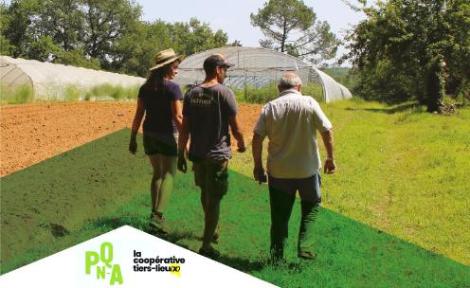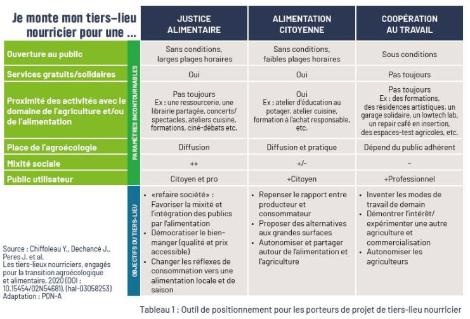The food-producing third place, an example of a regional initiative
2024
The sum of actions and actors is not enough to transform agriculture and food. A systematic approach is needed. This means strengthening the links between the actions taken and cooperation between these actors. In Nouvelle-Aquitaine, there are 60 food-producing third places. These projects, which have emerged from economic, social and civic initiatives, are genuine catalysts for action in favour of healthy and sustainable food and agriculture. Together, the food-producing third places and the 35 PATs in Nouvelle-Aquitaine (2023 data) have every interest in cooperating to promote operational, informational and financial synergies in response to their common ambitions!
To download : plaquettetierslieuxhd_1_.pdf (21 MiB)

Third places with an agricultural and food focus
In June 2024, there were more than 220 third places in Nouvelle-Aquitaine, defined as shared and collaborative workspaces equipped with offices, workshops and agricultural land. A ‘nourishing’ third place is a third place whose purpose is agricultural and/or food-related; it seeks to (re)connect agriculture and food.
Between 2019 and 2020, FAB’LIM, INRAE, Institut Agro and Incitu carried out a France-wide survey (non-exhaustive) and characterisation of third places known as ‘nourishing’. These third places include at least one activity related to agriculture and/or food: production, processing, awareness-raising, research, training and/or local development, linked to regional issues of access to food and the promotion of local produce.
There are a multitude of nourishing third places. Third places often begin by addressing the subject of agriculture and food in a broad sense. After a few years, choices lead them to fall into one of the three groups defined in the table.
The data collected has identified three main types of food-related third places (in terms of openness to the public, services offered, social diversity, approach to agroecology, etc.), and FAB’LIM has set out to detail their main characteristics and the challenges they face.

A few figures on food-related third places in Nouvelle-Aquitaine
60 open third places say they offer activities related to agriculture and/or food. It should be noted that more and more third places in the pipeline indicate that they have an agricultural and/or food-related purpose. Although not entirely new, this type of shared workspace has become more prominent since 2016 and is growing in 2021. Post-lockdown, there has been a real boom in food-related third places. It is easy to hypothesise that the lockdown period has accelerated awareness of these issues and the capacity for collective responses to some of them within existing and emerging third places. Some third places combine two or more types.
Third places: spaces that foster cross-cutting regional dynamism and a wealth of expertise
Le Battement d’ailes & Co opened in 2005 in Cornil, in the Corrèze department. Young people from Corrèze initiated and led the construction and running of an agroecological and cultural centre on a self-management basis. Since January 2021, around thirty structures and initiatives have been coexisting, sharing, experimenting, transmitting and mutually reinforcing their economies. Throughout the year, all of these local organisations and initiatives, currently known as the ‘Ecosystem’, offer regular meetings, cultural events and educational workshops. These activities are aimed at all audiences through local and societal issues that concern them, such as biodiversity loss, the breakdown of social structures and ecosystem pollution.
La Grange, a nurturing third place opened in 2019 in Abjatsur-Bandiat, in the Dordogne region, is co-managed and co-run by the ‘Beurre dans les haricots’ association and its volunteers. The third place aims to recreate the ‘production-processing-consumption’ food loop.
« Blette comme chou, a local, participatory and affordable grocery store, was the first space to open. The third place also consists of collective and individual gardens, an educational garden, and an agricultural area for market gardening and goat farming. A bakery and a food processing workshop are currently being set up and will be available to citizens and professionals. In addition to food, La Grange also has a shared wood/metal workshop and five workshops for artisans of all kinds, which form ‘the artisans’ street’. The association is experimenting with a different way of working together, recreating social ties, solidarity and trust.